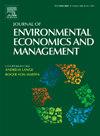有罪还是替罪羊?土地整理和绿篱退化
IF 5.9
3区 经济学
Q1 BUSINESS
Journal of Environmental Economics and Management
Pub Date : 2025-06-23
DOI:10.1016/j.jeem.2025.103196
引用次数: 0
摘要
土地整理是通过产权的空间再分配减少土地破碎化的标准政策工具;然而,对景观的不利影响的风险引起了对其环境可持续性的关注。本研究调查了法国下诺曼底地区植物篱网整治对景观的影响。在纵向调查(1972-2010)中实施交错差中差策略,我们发现固结导致树篱密度显著降低- 14.3 米/公顷(标准误差:2.33),占固结地区观察到的总体下降的13.7 %。我们还发现,随着整合时间和整合后时间的推移,影响逐渐减小,初始篱密度越高,影响越大,没有溢出效应,对网络连通性产生负面影响。一份成本效益分析纲要显示,连根拔起树篱的社会成本大于个人收益。总体而言,本文证实了土地整理在经济成本上显著促进了绿篱的减少,但它挑战了关于政策在其他景观变化因素方面的责任份额的普遍看法。本文章由计算机程序翻译,如有差异,请以英文原文为准。
Guilty or scapegoat? Land consolidation and hedgerow decline
Land consolidation is a standard policy tool to reduce land fragmentation through the spatial redistribution of property rights; however, the risk of adverse effects on the landscape raises concerns about its environmental sustainability. This study investigates the landscape impacts of consolidation on the hedgerow network of Lower Normandy, France. Implementing a staggered difference-in-differences strategy on a longitudinal survey (1972–2010), we show that consolidation led to a significant reduction in hedgerow density of −14.3 m/ha (standard error: 2.33), accounting for 13.7 % of the overall decline observed in consolidated areas. We also find a diminishing impact over time of consolidation and time since consolidation, an increasing impact with higher initial hedgerow density, no spillover effect, and a negative impact on network connectivity. An outline cost-benefit analysis suggests that the social costs of uprooting hedgerows outweigh the private benefits. Overall, this paper confirms that land consolidation has significantly contributed to the decline of hedgerows with economic costs, but it challenges prevailing beliefs about the policy’s share of responsibility with respect to other landscape change factors.
求助全文
通过发布文献求助,成功后即可免费获取论文全文。
去求助
来源期刊
CiteScore
8.00
自引率
4.30%
发文量
91
期刊介绍:
The Journal of Environmental Economics and Management publishes theoretical and empirical papers devoted to specific natural resources and environmental issues. For consideration, papers should (1) contain a substantial element embodying the linkage between economic systems and environmental and natural resources systems or (2) be of substantial importance in understanding the management and/or social control of the economy in its relations with the natural environment. Although the general orientation of the journal is toward economics, interdisciplinary papers by researchers in other fields of interest to resource and environmental economists will be welcomed.

 求助内容:
求助内容: 应助结果提醒方式:
应助结果提醒方式:


